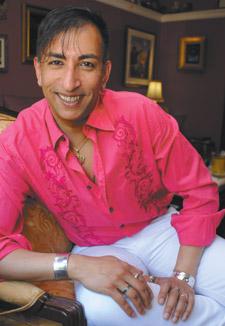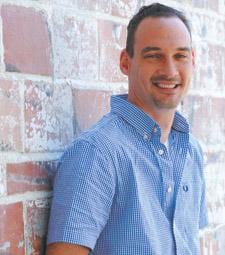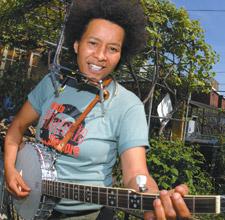
EL-FAROUK KHAKI. "Limiting discussion of human rights and democracy is dangerous and problematic." Credit: Joshua Meles

John Maxwell for the AIDS Committee OF TORONTO. "It was our community that said we can't stop and we won't stop because members of our community are dying." Credit: Joshua Meles

THE TORONTO ROLLER DERBY LEAGUE. "Girls on skates, kicking ass," represented here by Alicia Bernard (aka Bambi), Natasha Jesenak (aka Nasher the Smasher), Maggie Dort (aka Land Shark) and Charlene Jobborn (aka Dickless Tracy). Credit: Glenn Mackay
Every year members of Toronto’s queer community nominate and vote for the individuals and groups they feel should lead off the Pride Parade and the Dyke March. Those chosen are not only prominent members of the community, but also personify Pride Week’s theme, which this year is “Can’t stop, won’t stop.”
While those chosen this year — at a Pride Toronto general meeting back in April — are known to many, they may not be known to all. Here is a primer on just who will be leading your Pride Parade and Dyke March.
Honoured dyke Faith Nolan
Faith Nolan is known for shaking things up. Her appearance at the Pride Toronto meeting at which honorees were determined was no exception. Instead of giving another in a long succession of speeches Nolan went up to the front of the room with her guitar and sang an original song that had the crowd clapping with a few singing along.
Born in Halifax, Nolan grew up in Toronto’s Cabbagetown neighbourhood. She left home in 1971, at the age of 14, after she came out to her mother.
“She asked me if I was a lesbian, I said yes, and she said, ‘Stop being a lesbian.’ When I said no, she said, ‘Get out.’”
As a folk singer she slowly but surely came out to others through her performances, but that didn’t always go well, either.
“I would lose gigs, friends would dump me, but it became an increasingly powerful feeling to come out everywhere,” she recalls.
Nolan hasn’t stopped telling her story through song — she released her 13th album this year, titled Mannish Gal — and fighting for social justice.
“My music is my political work,” she says, “and my politics are firmly rooted in my perspectives as working class, a woman, African-Canadian and queer.”
Nolan’s activism also centres around poverty, racism and the prison system. She is the founder of the Kingston Women Prisoners Choir and produced the film Within These Cages about women in prison.
As someone of mixed African, Mi’kmaq and Irish heritage who grew up poor Nolan understands how the different isms collide.
“Along with being queer, we also carry the institutionalized burdens of racism, classism, ableism, sexism,” says Nolan, “and until all of us have full equality, none of us do. Until all of us are free, none of us are free.”
Grand marshal El-Farouk Khaki
In February 2003 El-Farouk Khaki — a noted refugee lawyer, human rights crusader and gay Muslim activist — was asked to organize the Salaam: Queer Muslim Community/Al-Fatiha International Queer Muslim Conference in Toronto. But he wasn’t sure he wanted to do it.
“I was concerned about security issues,” Khaki recalls. After all, post-9/11 nerves were still raw. But he was also worried about the health of his then-partner Guy Lahaie (who died in Jun 2003).
“I asked Guy what I should do,” Khaki remembers, “and he said to me that if we did not do it, who would? Who could? He said, ‘We must.’”
A native of Tanzania, Khaki’s family fled in 1971 to escape political persecution — first to the UK, then to Vancouver. He has lived in Toronto since 1989. His law practice, started in 1993, primarily represents people seeking protection due to their sexual orientation, gender, gender identity or HIV status.
Khaki is also the chair of Africans in Partnership Against AIDS, secretary general of the Canadian Muslim Union and on the boards of Salaam: Queer Muslim Community and, as of May, queer lobby group Egale Canada.
Sometimes his outspokenness leads to controversy. Khaki was recently at the centre of a debate about political messaging at Pride after he spoke at an event held by Queers Against Israeli Apartheid (QuAIA) — a group whose inclusion in the Pride Parade is causing concern among some Jewish groups. Although it turns out QuAIA did not slip into last year’s parade as was widely reported but rather was invited to march with the contingent of the Canadian Union of Public Employees, the kerfuffle has led to Pride Toronto tightening up enforcement to keep unregistered groups out of the parade.
“I recall the days when people could just jump into the parade. Now we have barricades. The price of success and acceptance?” he asks.
“I’m not big on limiting freedom of expression [just] because I do not like what others are saying…. Limiting discussion of human rights and democracy is dangerous and problematic.”
Honoured group the AIDS Committee of Toronto
Pride’s theme “really resonates” with the AIDS Committee of Toronto (ACT), according to John Maxwell, the organization’s director of policy and communications.
After all ACT — Ontario’s first AIDS service organization — was founded in 1983 at a time before HIV was even discovered and linked to AIDS. No treatments were available, fear and homophobia ruled the day and people with HIV/AIDS were shunned by family, friends and the medical system. Governments didn’t know what to do about the outbreak.
“However our community pulled together and formed ACT to educate, to support and to advocate,” says Maxwell. “It was our community that said we can’t stop and we won’t stop because members of our community are dying.
“At the same time we also decided that we can’t stop — and we won’t stop — living our lives as queer people. So the educational materials we developed did not tell people not to have sex. Rather it promoted safer sex.”
That unstoppable attitude is still part of ACT today, says Maxwell.
“ACT continues its work to educate and to support, and continues to advocate for change,” he says, “and we still take a sex-positive approach to our HIV-prevention work. As we like to say it, ‘Just say know,’ instead of, ‘Just say no.’”
Being chosen as Pride Toronto’s honoured group couldn’t have been timed any better for the organization. The parade will cap off ACT’s 25th anniversary year.
“Of course we hope we won’t need to be around for another 25 years,” says Maxwell. “But until that day when there is a cure for HIV/AIDS… [ACT] will remain committed to the community.”
Dyke March honoured group the Toronto Roller Derby League
It started as a tale of two teams. More than three years ago, in a bar on Queen St W, a group of a dozen or so women — and a couple of guys — met to discuss the possibility of playing roller derby, a high-energy contact sport played on roller skates.
Unbeknownst to them a similar group was meeting on the east side of the city to explore the same goal.
Both teams — the Toronto Terrors and the Smoke City Betties — grew independently. In fact the Terrors grew so fast that it dissolved in April 2006 so that four separate teams could form — Chicks Ahoy, the Deadly Viper Assassination Squad, the Death Track Dolls and the Bay Street Bruisers.
Then, almost like the amalgamation of the megacity, someone had an idea to merge the west siders with the east siders to create one big league and in the summer of 2006 the Toronto Roller Derby League (ToRD) was rolled out.
Four years later ToRD is considered to be one of the largest roller derby leagues in North America with more than 70 active skaters and upward of 1,000 people attending each game.
Also impressive is that the league is completely owned and operated by the players, says Natasha Jesenak, aka Nasher the Smasher.
Not only will ToRD be helping to lead the Dyke March, but it is also hosting an all-queer roller derby event on Fri, Jun 26 as part of this year’s Pride festivities. The Clam Slam will pit ToRD players against queer skaters from other leagues and cities.
As Jesenak puts it, ToRD is ready to continue its tradition of “girls on skates, kicking ass.”

 Why you can trust Xtra
Why you can trust Xtra


